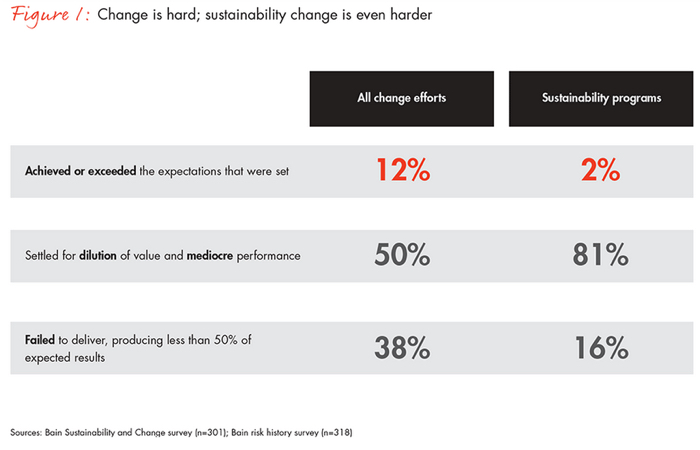
Only 2 percent of companies achieve or exceed their corporate sustainability goals, compared to 12 percent of other corporate transformation programs, according to a Bain & Company report.
Achieving Breakthrough Results in Sustainability details the results of a survey of more than 300 companies engaged in sustainability initiatives and interviews with the heads of sustainability at companies that have been recognized for their sustainability results.
It also highlights leading companies that are in that top 2 percent.
Nestlé, for example, announced water and other environmental management commitments in 2012, including a pledge to reduce water withdrawals per ton of product by 40 percent, compared with 2005 levels. “The feedback loop of committing, acting, reporting and then getting positive feedback from ratings agencies became a real driver for positive change,” said Janet Voûte, former head of public affairs at Nestlé, in the Bain report.
In 2015, Nestlé beat its water target, reducing usage per ton of product by 41.2 percent from 2005 levels. The company’s US factories are withdrawing 10 percent less water per ton of product than they did five years ago. Nestlé now ranks no. 1 in the food, beverage and tobacco category of the Dow Jones Sustainability Index.
Bain found that many employees do not see sustainability as a business imperative, with more than 60 percent of survey respondents citing public reputation as the key driver for sustainability change. Employees also deprioritize sustainability because of perceived business trade-offs and an absence of incentives. Lack of resources and competing priorities are the two top obstacles employees say threaten to derail sustainability programs, and less than a quarter of respondents say they are held accountable for sustainability through incentives.
Corporate sustainability leaders overcome organizational resistance by changing attitudes and behaviors. They rethink processes and incentives and confront the prevailing mindset that sees sustainability as bad for business.
Companies that do succeed in their sustainability initiatives say it is worth the investment. Sustainability efforts can invigorate the core business, bolster the customer value proposition, secure the supply of key resources, lower operational costs and improve employee satisfaction.
The study makes four recommendations to help companies achieve sustainability gains:
- Make a public commitment. Many executives hesitate to make their goals public, fearing reprisal from third-party watchdogs if they fall short. Sustainability leaders manage that downside risk by engaging proactively with stakeholders. They affirm that the benefits of public commitments significantly outweigh the risks by creating a shared sense of mission and helping companies stay the course during difficult phases.
- CEOs: lead by example. Bain’s research shows senior leadership support is the most important factor contributing to success, and visible actions — not just words — make the difference.
- Highlight the business case. Sustainability leaders help employees understand the business case that links sustainable products and processes with success. Growth for brands with a demonstrated commitment to sustainability was four times faster than non-sustainable products in 2015, according to the Nielsen Global Corporate Sustainability Report.
- Hardwire change through incentives and processes. Companies that achieve ambitious sustainability goals embed sustainable behaviors and processes throughout the business and make line managers responsible for delivering results. For example, some companies change their capital-approvals process to include sustainability factors, or increase time horizons in business case assessments, allowing more initiatives to qualify for investment.
Source: Environmentalleader












